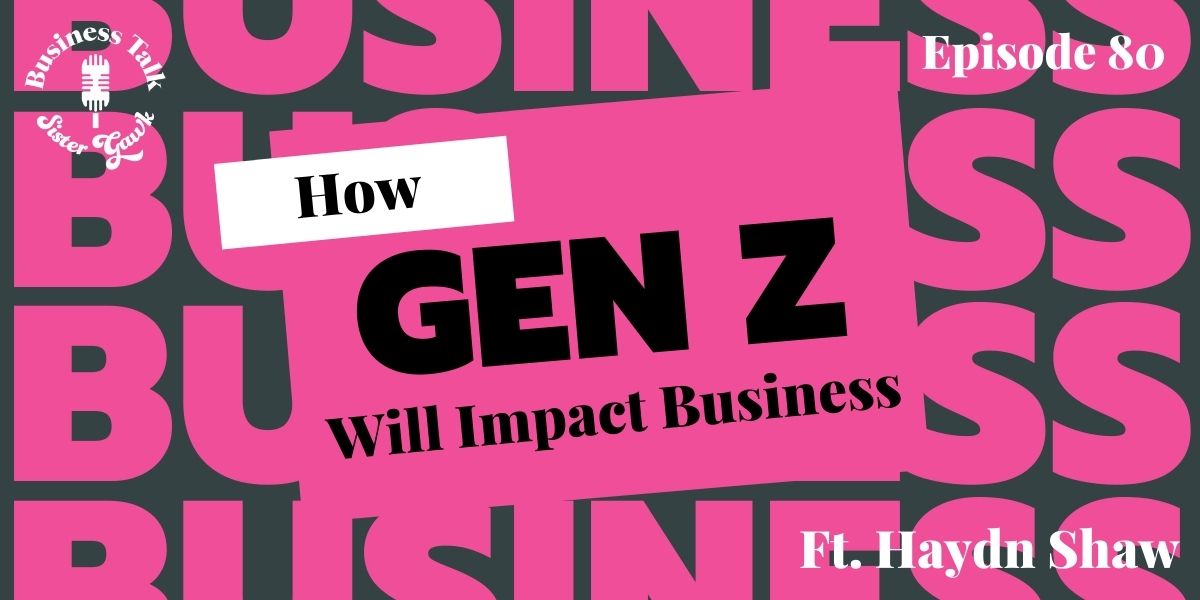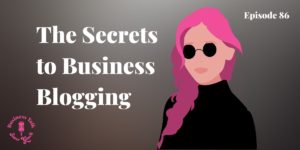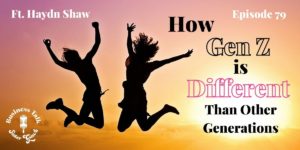This week, we pick up our conversation with generational researcher, Haydn Shaw, and get to finish off our 3 part series on Gen Z. If you missed the first episodes, check out 78 and 79 for more about Gen Z that you should know. This is the perfect episode if you’re trying to figure out how to position your small business or corporation to attract Gen Z to work for your business or be interested in your services. Wow! Take a listen for a great time!
Welcome to Business Talk Sister Gawk! I’m Bekkah! And I’m Ruthie! And today’s episode title is “How Gen Z Will Impact Business” and we are doing part two of an interview with Haydn Shaw and he is a generational researcher and author of the book “Sticking Points: How to Get 4 Generations Working Together in the 12 Places They Come Apart”.
If you missed the previous episode you should definitely go back and listen to it because we got a really good summary of how each generation is different, how different historical things impact them, and a lot of information on what Gen Z is being defined by right now. I’m excited to get into the business aspects of that as well. Thank you so much for being back with us today!
Haydn: Thanks for having me! It was a really fun conversation last time.
Gen Z Is Experiencing a Life Stage Called Emerging Adulthood
Bekkah: Yeah, we were kind of talking before we started recording. We were talking a little bit about this idea of “Tyranny of Choice” or people in Gen Z trying to choose and having opportunity costs within that. I just loved that poem you said by Sylvia Plath the tree poem. Could you tell us a little bit about that?
Ruthie: And also it might not be called the tree poem, but I just said, “Tree poem! Hmm!”
Haydn: It was a poem about a tree though! She compared her life to a tree and I think it does capture this new life stage of emerging adulthood that she talked about. Whatever branch she climbed other branches would shrivel up and as she got older her choices were reduced and that is one of the anxieties of emerging adulthood.
That new life stage is that there are so many choices! How do you decide among all the choices and how do you construct yourself? That’s one of the big challenges of that life stage. Adolescence has its tasks, or its challenges psychologists call it so does you know. So does the middle age and moving into second adulthood and then elderly.
All of those have their tasks that have to be handled. Well, one of the key tasks of emerging adulthood is creating your identity and while in adolescence people try on different things it’s like, “Oh, wow! She really did go goth on that!” And so that people try on different identities for different times in different time frames but emerging adulthood is where a person begins to define that. They begin to say, “I think this is what I’m about. I think this is what I want to do.”
They try some different things. They have a lot of choices and sorting through all those choices and defining themselves is at times an overwhelming task. You can see why there’s a quarter-life crisis and some of the older generations are like, “Quarter-life crisis? You’re still having your parents pay your cell phone bill! How’s their crisis!”
The quarter-life crisis is, “Why am I not happier? With all this freedom and all the support I have for my family and from – how am I not happier?” And it’s a very legitimate thing – a quarter-life of crisis. “Who do I want to be next? What are my choices?”
What Advantages Does Gen Z Have in Business?
Ruthie: So you have this full platter that you can choose from and it creates maybe just a little bit of fear and anxiety and that so what kind of areas do Gen Z have advantage in other generations in terms of like business specifically that they can pursue different things that you’re not seeing in other generations?
Haydn: Certainly, there is an expectation that organizations are going to be kinder.
Bekkah: Interesting!
Haydn: Just to put it in perspective The Economist Magazine talked about how managers have been expected to be more humane over the decades. They talk about national cash register where the founder of that was frustrated with an employee and he lit his desk on fire. It was a wooden desk back in the 1800s, he just lit it on fire. He was frustrated with him. Well, –
Ruthie: I would quit!
Haydn: There would be all kinds of legal matters about doing that today! You know what was typical behavior in the show Mad Men, what was typical behavior in the 60s, maybe a bit over the top for you know the show to be dramatic. It’s not unusual behavior. Maybe over the top but not at all unusual behavior.
All of that would get a person fired on social media, would get a person sued, and so one of the things is that Gen Z just expects in their minds you’re not a manager if you’re not a coach. Other generations wouldn’t be like, “ have a good manager who’s a good coach.” Now in Gen Z’s minds, the surveys are pretty clear. You can’t even define yourself as a manager if you’re not coach.
A much greater focus on being human at work and one of the other advantages – organizations are supporting that. It was hard to find people and it’s hard to find people in a lot of different industries and has been for a while and COVID slowed that down for a touch but now that the economy is moving again and people are spending money a lot of organizations can’t find people and can’t find the workers that they want.
It is a seller’s market not a buyer’s market when it comes to talent right now. That helps intensify that commitment to treating people well. In addition, the fact that we’re now in many, many industries much more comfortable working remotely. It gives choices. Millennials had to fight really hard in a lot of organizations to take two mornings off to work from a coffee shop.
Whereas, more and more people see what happened over the last 18 – you know 15 months as being the kind of thing that has reshaped the way we’ll work. Now, most people will go back to a physical workplace. Most people will do that but the options are there and Gen Z has the choice that other generations never really had.
Gen Z Wants to Go Into The Office
They want to go back to a physical workplace more than the other generation. That’s a kind of what was surprising to people, but they have the choice and they look for employers that allow that choice even if at this stage in their career they want to go into a physical workplace.
Bekkah: Do you think – I have a question but this is a side question – do you think that part of that is because when you were previously talking last week about Millennial parents and Gen Xer or parents telling Gen Z, “Hey, don’t be posting things, because that’s the first thing people are going to look at.” Do you think getting back in the office is exciting because it means there’s less liability when you’re trying to communicate people can see your tone in your face-to-face interaction?
Haydn: Oh, I don’t know if it’s a liability around, “Ooo! Wow! There are pictures of me with you know with one of those red cups full of beer!” It’s not as much liability that “I posted things I shouldn’t have posted a search for” but it’s the understanding that, yes, communication is more challenging and frankly people in remote work disappear.
This is the research on this has been clear for a decade when you have people who are in a physical space together and you have three or four people who are allowed to work remotely the people who are allowed to work remotely often feel like they’re invisible. That’s the word they used in 1,500 interviews they got reported on in 2019. They use the word “invisible” to describe what it’s like. What Gen Z knows is, “I am not going to grow a network remotely. I’m not going to get noticed remotely nearly as much as I’ll get noticed if I’m there physically.”
Ruthie: Wow!
Bekkah: Interesting!
Haydn: A big, big survey done by Microsoft big, big survey 30,000 people so it’s a big one. That was one of the surprises is they want the option like all generations do but they want to go into work. Funny the Boomers didn’t want to work remotely for the first half they were adamant, “I’m going back to work!” And then the second half they’re like, “No, I’m not wearing pants! *all laugh* I want to stay remote forever!”
Ruthie: I changed my mind!
Haydn: Once they got comfortable with all the technology they’re like, “I could do this! This is better!”
How Will Gen Z Change The Way Business is Completed?
Bekkah: Yeah, so that was my tangent. Now, this is my real question. Okay, how will Gen Z change the way business is completed?
Haydn: A lot more comfortable juggling between the social media world and email and other technologies. They’re comfortable speaking to people, they’re comfortable in groups. They’re more independent than the Boomers were – the Baby Boomers and they’re more independent than the Millennials were. Some Millennials were like, “Let’s do this in teams!” And Xers are much more, “You know, you get more done when you work on your own than if you do a group project?”
That’s a big shift! Because Xers are like, “Yeah, you know about every third about – two out of three group projects worked and about one out of three – two of us ended up doing all the work while the others were lazy. Just faster and easier if I do it myself.” That’s been a shift so far in what’s showing up, but you know they can bounce between different formats and they’re much more comfortable in social.
There are a lot of things that happen in social for example Harvard Business Review had an article on if you’re going to do business in China they work off of the phone not off of their computers so you would better – and most of the advertising is done socially. So you better be good at social rather than traditional what is traditional, US advertising. Those are all ways this new generation is going to change it up and get work done differently.
How to Prepare Your Business for Generation Z
Ruthie: Yeah, so how can businesses prepare for this new generation coming into the marketplace?
Haydn: They need to be afraid! Be very afraid! *all laugh*
Ruthie: Okay, write that down! Put that on a t-shirt.
Haydn: Hey, that could be the alternative to, “Okay, Boomer, have a terrible day” t-shirt. You know in many ways they’re going to be nose to the grindstone. Whereas you know Xers and Millennials really had dress code as an issue. For Gen Z they’re like, “Yeah, dress code, whatever.” Most of them said, “I’m gonna address whatever their standard is at the company.”
Because they’ve got parents saying to them, “You’re not living here at home! You’re not pursuing your theater dream.” And they were told by their parents, “Go get a degree that has a market that you can sell and then go do those other things if you want to!”
But you know parents are much less willing to pay all that money and go into $37,000 in debt for people to pursue a dream. For Millennials it was you know 68% of people “I think you ought to pursue your dream rather than have a job with stability” and it was just flipped with Gen Z! Gen Z’s like, “No, go for stability versus pursue your dream!”
Ruthie: If a business owner is looking to hire someone who’s from the Gen Z generation – I guess that’s probably redundant to say “Gen Z generation” – anyways!
Haydn: You said it just fine! That’s valid because since Gen Z is an official title! Adding generation is completely valid!
Ruthie: Okay, what are some common things to be aware of when you’re – as a business owner hiring someone from Gen Z?
Haydn: You bet! You know we talked about emerging adulthood a bit now and I would say go watch the TED Talk that I did. “Why Half of What You Hear about Millennials Is Wrong” because Gen Z is also in this emerging adulthood life stage. A lot of people – I had somebody pull me aside at a conference and said, “I would pay you big money if you could tell me which ones to hire that’ll stay 30 years.” I said, “Well, the answer is probably none of them!”
Ruthie: Done.
Haydn: Yeah, and so he goes, “Yeah, that’s what I was afraid of! I said, “Emerging adulthood means ‘I might meet somebody online and might move to Seattle even though I’m next in line for promotion in the succession plan. You may be grooming me for a role and I may go hmm I think we can make this work but you know they just got a really great job in Seattle and so I’m going to move out there and see if we can make it work!’”
What Differences Will Gen Z Have in Small Businesses & Corporate America?
Bekkah: So how do you anticipate changes from Gen Z affecting different business sizes? Is there going to be a difference between small business versus Corporate America?
Haydn: Well, Corporate America – I met a guy on a plane that I go to church with and he said to me, “We’re just having real trouble competing because some of our competitors” – he installs security systems for businesses and he goes, “Some of our competitors are offering ten dollars more an hour than we can!” But you can imagine in service business that’s a lot of money! He goes, “Oh, we just can’t compete with that! So what are we going to do? I said, “Well, what do you offer that they don’t offer?”
He goes, “Well, you know they have work Saturdays and if your kid has a recital it really doesn’t matter. If you didn’t put in for it for your few days off of vacation then it doesn’t matter.” I said, “So, basically, you let them – if they’ve got a family member in the hospital you’ll schedule around them. If they’ve got something they want to see of their child they can go do that.” He goes, “Yeah.” I said, “That may not be worth 10 bucks an hour to everybody at every stage in their life but that’s worth 10 bucks an hour to a lot of people.”
Smaller businesses can be kinder. More people-oriented, more willing to listen, more flexible. Unless, they get somebody who wants to copy what they think of as Corporate America and gets all cranky and hard-nosed. Then they lose their advantage! I said, “You ought to tell people, ‘Hey, we know you could make more money someplace else. Here’s what we offer!’ and you ought to look with swagger in your eye about all the benefits being small has over being one of those big divisions of a huge corporation where they’re going to be on their good day they’re only going to be a number.”
I said, “If you’re in a smaller business you ought to work that like crazy!” Well, if you’re a large corporation you’ve got all kinds of resources. You’ve got mentoring programs you’ve got technology. One of the things ginzI really cares about is the technology they get to use. Well, you know larger corporations frequently have more buying power on technology costs so they can get sometimes some fancier things.
Now, it’s so funny by the way that smaller businesses are going, “Wow! Turnovers are expensive!” I know so spend $1,700 bucks for a laptop or a computer system that has a standing desk and what they want to use because it’s cheaper than turnover! You know and so people are like, “Oh, yeah! Here’s Lenovo from 1816! There’s a handle on there, see if you can pull start that puppy!”
The new people get those and the irony is you got the older generations that really don’t know how to use all the bells and whistles. “Hey, when’s the last time you edited video and needed all that capacity?” “I don’t know but man my ram is amazing! I think I have 4.2 billion ram on this thing!” Yeah, you could render the world on that but you don’t ever do that kind of work so why don’t you swap out with somebody else.
Companies Are Having to Change Contracts to Allow Side Hustles
Bekkah: Yeah, so another question I have regarding that aspect of like Corporate America offering all these really great benefits but when a lot of Corporate America is becoming more subcontractor-based how do you think this is going to affect Gen Z entering the workforce with so many side hustles and all these different things of how they’re looking to make money?
Haydn: What’s interesting how many companies are having to change their contracts. Companies with contracts that say no side hustle, because you’ve got so many people going, “Oh, okay, well, never mind then!” Really come back! Wait! Come back here. What do you mean? Well, I already have six or seven clients I’m not gonna tell them “no”. Or I’ve been doing a podcast or I’ve been and they’re like, “Oh, really!”
I said that a side hustle is a great thing because if there’s any challenge for younger generations is they get bored! We assumed we were going to be bored! Work was a four-letter word for a reason, but younger generations are like, “I’m bored,” “Yes?” “Okay, I have other options! I’m bored!” “I don’t know why you’re telling me this! Sounds like a personal problem.” “I’m bored.” And then they’re gone! “I can’t believe they left us!”
Well, didn’t they tell you three times they were bored? “It’s work! It’s supposed to be boring!” One of the things that large corporations can do is give people a lot of options of things they can do so they don’t have to be bored. Secondly, side hustle allows people to have something else they’re focused on even when the work is boring or when they’ve mastered it. So a side hustle is a great way of keeping people around longer.
Ruthie: Yeah! Wow! That’s so interesting! I love that!
Haydn: And more than that they’re not going to come and work for you many people if they can’t do a side hustle.
Bekkah: Yeah, I’ve definitely seen a lot of people say, “Oh, I’m not working there because they have a non-compete clause.” So definitely for sure well we have enjoyed so much all of these questions we have one more question for you. What tools and resources would be helpful for Gen Z to understand if they’re going to be successful in the future?
What Tools & Resources Should Gen Z Understand in Business?
Haydn: Oh, for sure and you know it’s going to sound very self-serving but that’s one of the reasons I updated Sticking Points so that Gen Z in some ways Baby Boomers have seen all the historical events like we talked about in the last episode. All the historical events that shaped all the generations younger than them.
The generation with the greatest disadvantage is Gen Z because they’ve not personally experienced the events that shape people. So the word you used in the last episode was so wonderful it gives us more grace with other people! We’re just more patient with other people and we’re better at communicating with them when we understand not only what they think but why they think it.
That was the entire design of the sticking points book is to help those five generations understand why they think that way. More than anything else Gen Z needs to understand why older generations think the way they do so that they don’t really mean, “Okay, Boomer, have a terrible day!” So that they really don’t mean that so that it just goes back to being a joke.
If you enjoyed this episode, please share it with a friend (episode 80).




